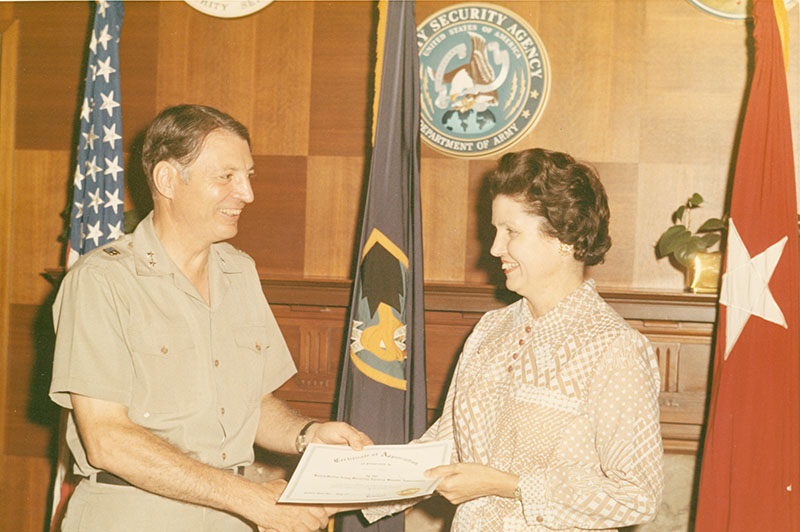U.S. Army Intelligence Analyst During World War II

Oral histories are used to understand historical events, actors, and movements from the point of view of real people’s personal experiences.
1920-2022
The life of long-time Arlington resident Gertrude "Trudy" Ensign was recently memorialized at Clarendon United Methodist Church. Born October 4, 1920 on a farm in southwest Iowa, Ensign left Iowa to take a job with the Army Security Agency (a precursor to the NSA) during World War II, settling in Arlington, where she lived until her death on February 28, 2022.
In November 2017, Ensign recorded an oral history with the Center for Local History. She spoke about her work during the war, as well as life in Arlington.
In this excerpt from the oral history, she talks about her work during the war. While not a code breaker herself, Ensign worked in Army communications.

Col. Mosser presents Mrs. Gertrude C. Brown (Ensign) with an Outstanding Performance Rating Award on 30 March, 1971 at Arlington Hall Station (from reverse of photo)
Narrator: Gertrude Ensign
Interviewers: Judith Knudsen
Date: November 6, 2017
INTERVIEWER: Well, when you say there were people there, they were cracking Japanese code. That was not your job.
NARRATOR: Yes. Not my job.
INTERVIEWER: So what codes were you getting? Were you getting the codes that had been cracked, and then you had to encipher with the—
NARRATOR: Okay. This is the part that I think we have to understand, that none of this could happen if we didn’t have field stations.
INTERVIEWER: Okay.
NARRATOR: Because that’s where our intercept came from. Like Vint Hill Farm was an intercept station, and they had a whole field of antennas up out in the field. There were field stations in the Pacific, and there were field stations in Alaska. I think there were some in Europe, too. It made sense. If not field stations, then they had some other options. Maybe they had direction-finding stations, which, you know, you have a unit with direction equipment, maybe 180 degrees, and if you all were pointing at this thing, then you would be able to intercept—find a station, an enemy station you were looking for, and be able to intercept them.
INTERVIEWER: Okay.
NARRATOR: And if you could do that, then you could identify the location, because you were getting the signals from different locations based on where you were. So that was really the part that—our part of what happened at ASA [Army Security Agency]. I mean, we knew that there was a whole building called B Building where they were trying to break the codes. But that was not any of what we were concerned with. When the codes were broken I guess they went wherever they were supposed to go, which would have been, you know, teletyped there someplace else. But anything that we—most that we handled was administrative and keeping the field stations open and things like that. After the war we probably had more like regular communications, because we’d have the commanders of the different field stations come back in. At that point I had moved to a different job, because when—during the war there was no question about you having a job there. But when the war was over, one of the bosses came out to me one day and said, “You know, the war’s over, and the boys are coming back. They said there’s a gentleman here in the area that has the same qualifications you do, because he worked in the field during the war. And he has a promote—he can take your job,” in other words. But they said, There’s a job open down in what we call GAS50, and you can go down and apply for that job. Well, it sort of took me by surprise, of course, but that’s exactly what I did. That job then, the gentleman that interviewed me said, “Well,”—I think I was a GS6, 00:11:00 and he said, “You’ll have to take a break to a GS5.” But then he said, “When you get your promotions, it’ll be a GS5-7-9-11-13,” and so that’s what I did then. So when I retired I was GS13, which was a very nice grade.
INTERVIEWER: Yes, it is a very nice grade.
NARRATOR: It left me a very nice income.
The goal of the Arlington Voices project is to showcase the Center for Local History’s oral history collection in a publicly accessible and shareable way.
The Arlington Public Library began collecting oral histories of long-time residents in the 1970s, and since then the scope of the collection has expanded to capture the diverse voices of Arlington’s community.
To browse our list of narrators indexed by interview subject, check out our community archive. To read a full transcript of an interview, make an appointment to visit the Center for Local History located at Central Library.
Do you have a question about this story, or a personal experience to share?
Use this form to send a message to the Charlie Clark Center for Local History.
Center For Local History - Blog Post Message Form
Do you have a question about this story, or a personal experience to share? Use this form to send a message to the Center for Local History.
"*" indicates required fields